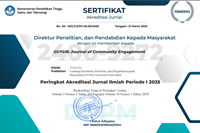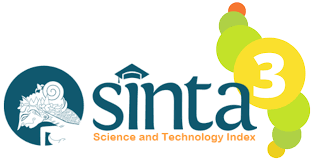Akhmad Shunhaji, N. F. (2020). Efektivitas Alat Peraga Edukatif (APE) Balok Dalam Mengembangkan Kognitif Anak Usia Dini Akhmad. Block Caving – A Viable Alternative?, 2(2), 1–30. https://doi.org/10.1016/j.solener.2019.02.027
Aliwar. (2016). Penguatan Model Pembelajaran Baca Tulis Quran Dan Manajemen Pengelolaan Organisasi (Tpa). Jurnal Al-Ta’dib, 9(1), 21–37.
Amalia, L., & Saraswati, T. (2018). The Impact of Competencies Toward Teacher’s Performance Moderated By the Certification in Indonesia. KnE Social Sciences, 3(10). https://doi.org/10.18502/kss.v3i10.3363
Andriani, S. D., Asriati, N., & Syahruddin, H. (2018). The influence of professional competence and self-efficacy teachers’ on student achievement in economic learning. International Journal of Academic Research and Development, 3(3), 282–285.
Arsana, I. W., Anggreni, M. A., & Patriani, S. R. (2019). Pemanfaatan Benda-Benda Bekas Sebagai Alat Permainan Edukatif (Ape) Untuk Anak Usia Dini. Journal of Chemical Information and Modeling, 3(1), 17–30.
Atmaja, H. T. (2019). Pelatihan dan Pendampingan Pembuatan dan Pemanfaatan Media Audio-Visual Interaktif dalam Pembelajaran Sejarah yang Berbasis pada Konservasi Kearifan Lokal Bagi MGMP Sejarah Kabupaten Banjarnegara. JURNAL PANJAR, 1(2), 131–140.
Epstein, R. M. (2002). Defining and Assessing Professional Competence. JAMA, 287(2), 226. https://doi.org/10.1001/jama.287.2.226
Erlina, N., I Wayan Sukra Warpala, & Putu Prima Juniartina. (2022). Pengembangan Alat Peraga 3D berbasis Eco-Friendly melalui Project Based Online Learning untuk Meningkatkan Kreativitas Ilmiah Calon Guru IPA. Jurnal Pendidikan Dan Pembelajaran Sains Indonesia (JPPSI), 5(2), 177–186. https://doi.org/10.23887/jppsi.v5i2.52785
Etivali, A. U. Al, & PS, A. M. B. K. (2019). Pendidikan Pada Anak Usia Dini. Jurnal: Penelitian Medan Agama, 10(2), 212–237.
Fadhila, O., & Rakimahwati, R. (2020). Limbah daur ulang dapat meningkatkan kreativitas anak di taman kanak-kanak. Jurnal Pendidikan Tambusai, 4(1), 445–452.
Ferronato, N., & Torretta, V. (2019). Waste mismanagement in developing countries: A review of global issues. International Journal of Environmental Research and Public Health, 16(6). https://doi.org/10.3390/ijerph16061060
Glickman, C. D., Gordon, S. P., & Ross-Gordon, J. M. (2017). Supervision and Instructional Leadership. Pearson.
Goodwin, A. L. (2021). Teaching standards, globalisation, and conceptions of teacher professionalism. European Journal of Teacher Education, 44(1), 5–19. https://doi.org/10.1080/02619768.2020.1833855
Hasanah, U. (2019). PENGGUNAAN ALAT PERMAINAN EDUKATIF (APE) PADA TAMAN KANAK-KANAK SE-KOTA METRO. AWLADY : Jurnal Pendidikan Anak, 5(1), 20. https://doi.org/10.24235/awlady.v5i1.3831
Hayati, Z. (2019). Penggunaan Alat Permainan Edukatif (Ape) Dari Botol Plastik Dan Koran Bekas Untuk Meningkatkan Kreatifitas. AWLADY : Jurnal Pendidikan Anak, 5(1), 56–79.
Hellriegel, D., & Slocum Jr, J. W. (2011). Organizational Behavior. South-Western Cengage Learning.
Huda, H., Soeoed, R., & Sjamsir, H. (2020). The Effect of Professional Competence on the Work Effectiveness of State Vocational School Teachers in Samarinda-East Kalimantan Huda. Journal of Research in Humanities and Social Science, 8(8), 24–29.
Kumala, S., Arifa, T. R., Ansari, M. I., & Jumiati, J. (2022). Pelatihan Dan Pendampingan Pembuatan Alat Peraga Edukatif Botanhi (Boneka Tan gan Hijaiyah ) Pada Tim Penggerak Pkk Desa Sungai Gampa Kecamatan Rantau Badauh Kabupaten Barito Kuala. Al-Khidma: Jurnal Pengabdian Masyarakat, 2(1), 34. https://doi.org/10.35931/ak.v2i1.1001
Kumala, S., Hafiz, A., Ansari, M. I., Arifa, T. R., & Jumiati, J. (2022). PELATIHAN DAN PENDAMPINGAN PEMBUATAN ALAT PERAGA EDUKATIF PADA MATA PELAJARAN FIQIH DI MI PLUS AL FALAH SUNGAI LULUT BANJARMASIN TIMUR. Jurnal Vokasi, 6(3), 206. https://doi.org/10.30811/vokasi.v6i3.3301
Laila, A. N., & Candraloka, O. R. (2019). Pemanfaatan Potensi Alam sebagai Alat Permainan Edukatif di PAUD Delima Jobokuto Jepara. E-Dimas: Jurnal Pengabdian Kepada Masyarakat, 10(1), 76–82. https://doi.org/10.26877/e-dimas.v10i1.2883
Lena, H., Rukiyah, R., Syafdaningsih, S., Rantina, M., Utami, F., Karnita, A., Karnita, A., Munawaroh, A., & Munawaroh, A. (2021). Pelatihan Pembuatan Alat Permainan Edukatif Berbasis Pendekatan Saintifik bagi Guru PAUD di Kota Palembang. Bubungan Tinggi: Jurnal Pengabdian Masyarakat, 3(4), 332. https://doi.org/10.20527/btjpm.v3i4.2480
Makovec, D. (2018). The teacher’s role and professional development. International Journal of Cognitive Research in Science Engineering and Education, 6(2), 33–45. https://doi.org/10.5937/ijcrsee1802033M
Matur Rahmi, A., Srianita, Y., & Kurniawan Chairul, A. (2023). Program Pendampingan dan Pelatihan Pembuatan Alat Permainan Edukatif Berbasis Manajemen Pembelajaran Matematika bagi Guru PAUD di Kecamatan Mustika Jaya Kota Bekasi. Jurnal Pendidikan Tambusai, 7(2), 7422–7427. https://jptam.org/index.php/jptam/article/view/7404
Mujtahid, I. M. (2020). Pendampingan Pengembangan Alat Peraga Edukatif Untuk Guru-Guru SD DAN PAUD di Pekanbaru Riau. Universitas Terbuka.
Mulder, M. (2014). Conceptions of professional competence. In International Handbook of Research in Professional and Practice-Based Learning. Springer.
Mundiri, A. (2016). The Leadership of Headmaster In Building A Work Culture Based On Pesantren. Improving The Quality of Education and Training Through Stengthening Networking, 1–7.
Nisa, W. (2020). The Contribution of Professional Competence through the Work Discipline and Performance to Teacher Work Productivity in Public Elementary School of Tabunganen Subdistrict, Barito Kuala. Journal of K6 Education and Management, 3(2), 149–157. https://doi.org/10.11594/jk6em.03.02.06
Oktradiksa, A., & Aufa, M. (2019). PKU Bagi MI Muhamamdiyah Rambeanak 2 Kabupaten Magelang, Melalui Alat Peraga Edukatif (APE). Publikasi Pendidikan, 9(3), 227. https://doi.org/10.26858/publikan.v9i3.8616
Orazbayeva, K. O. (2016). Professional Competence of Teachers in the Age of Globalization. INTERNATIONAL JOURNAL OF ENVIRONMENTAL & SCIENCE EDUCATION, 11(9), 2659–2672.
Rahmah, N., Nursyamsi, & Subhan. (2022). Pendampingan pembuatan alat permainan edukatif (APE) matematika bagi guru PAUD di Kelurahan Balandai Kota Palopo. Transformasi: Jurnal Pengabdian Masyarakat, 18(1), 137–153. https://doi.org/10.20414/transformasi.v18i1.4345
Rangkuti, M. A., Manurung, I. F. U., Tarigan, N., Panggabean, D. D., Irfandi, I., Harahap, M. H., & Syah, D. H. (2019). Pendampingan Guru-Guru Sekolah Dasar Mendesain Pembelajaran Tematik Berbasis Alat Peraga Di Kecamatan Medan Helvetia. Publikasi Pendidikan, 9(3), 232. https://doi.org/10.26858/publikan.v9i3.10296
Rozi, F., & Kamalia, S. (2023). CREATING POSITIVE LEARNING ENVIRONMENT THROUGH WORK-LIFE BALANCE BASED HUMAN RESOURCE DEVELOPMENT. PEDAGOGIK: Jurnal Pendidikan, 10(1), 1. https://doi.org/10.33650/pjp.v10i1.5575
Saguni, F., Hamlan, H., & Gusnarib, G. (2021). The Adversity Quotient Between Teacher Professionalism on Student’s Autonomous Learning. Journal of Social Studies Education Research, 12(3), 312–342.
Sulastri, Y. L., Rahma, A., & Hakim, L. L. (2017). IbM Pembuatan Alat Permainan Edukatif (APE) Ramah Anak Bagi Guru Paud di Kota Bandung. Jurnal Pengabdian Kepada Masyarakat, 7(2), 84. https://doi.org/10.30999/jpkm.v7i2.177
Trenggonowati, D. L., & Kulsum. (2018). Analisis Faktor Optimalisasi Golden Age Anak Usia. Journal Industrial Servicess, 4(1), 48–56.
Uswatun, U., Suryani, L., Rohayati, Liza, M. El, & Saputra, N. I. (2022). Analisis deskriptif penerapan model pembelajaran bcct dalam mengembangkan kemampuan berpikir kritis pada anak usia dini. Atthufulah: Jurnal Pendidikan Anak Usia Dini, 3(26–36).
Wulansari, B. Y., & Sugito. (2016). Pengembangan Model Pembelajaran Berbasis Alam Untuk Meningkatkan Kualitas Proses Belajaranak Usia Dini. Jurnal Pendidikan Dan Pemberdayaan Masyarakat, 3(1), 16–27.
Zamroni, Amir, & Saleha, L. (2021). Pengelolaan APE Berbahan Limbah untuk Meningkatkan Kecerdasan Kognitif Anak. Jurnal Obsesi : Jurnal Pendidikan Anak Usia Dini, 5(2), 1382–1395.

 (Universitas Nurul Jadid)
(Universitas Nurul Jadid) 









.png)
